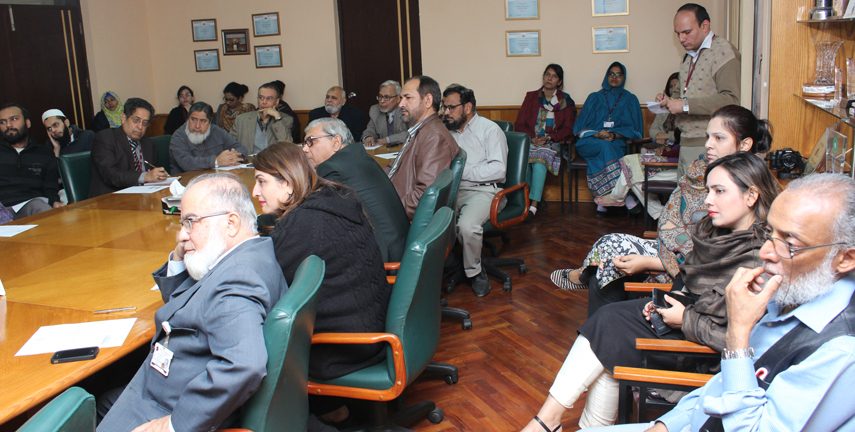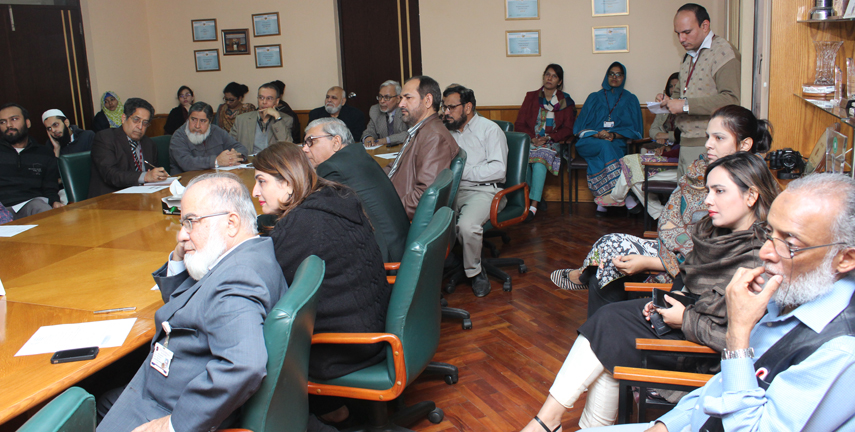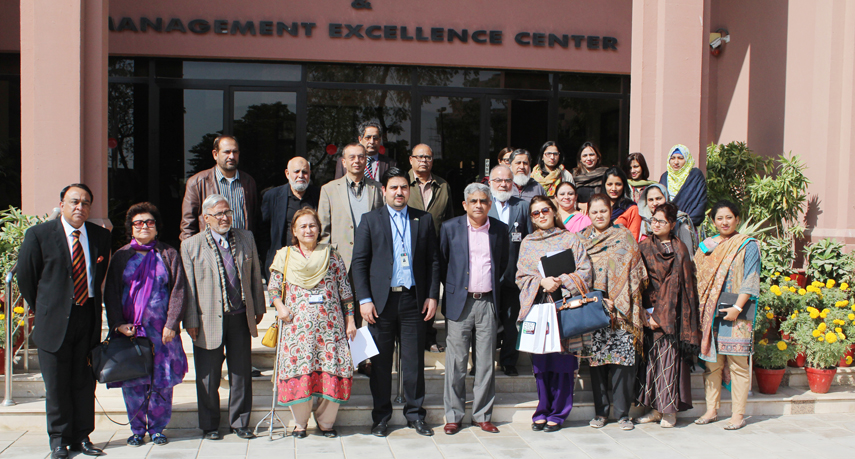During the third meeting of the Pakistan Afghanistan Joint Committee (PAJC), held at Karachi, as part of outreach and university interaction planned for the group, one member each from the PAJC visited the Institute of Business Management (IoBM) on Wednesday, January 11, 2017. The Pakistani speaker was Member of National Assembly of Pakistan, Ms. Shazia Marri, while the Afghan speaker was former Deputy Minister for Commerce and Trade of Afghanistan, Mr. Mozammil Shinwari. Both spoke on “Pak-Afghan relations: Countering Misperceptions and Negative Narratives”. Project Director for Beyond Boundaries, Mr. Aized Ali represented CRSS.
The group members were welcomed by Dr. Talat Wizarat, Head of Social Sciences Department, and Mr. Talib Karim, Rector and Executive Director. Dr. Wizarat introduced the two distinguished members from Pakistan and Afghanistan. Mr. Ali gave a brief presentation on the project Beyond Boundaries, including phase one and the current phase two, and the project activities held so far through track II dialogues and other important sideline strategic meetings, to improve bilateral relations through such people to people contacts at civil society levels. There were about 35-40 students and faculty members of IoBM.
Shazia Marri thanked the IoBM for arranging this interaction, in her presentation she said: “first of all let me condemn and condole with Mr. Shinwari for the terrorist attacks that took place yesterday in Kabul and Kandahar. This makes it more important for us to sit down, discuss, challenge and fight this menace of terrorism. During this series of dialogues I have met Afghans; unfortunately, there were pre-conceived misperceptions, acrimony, bitterness, and hatred that I was hammered with. I wondered with our previous help to the Afghan refugees; why this bitterness? We have language, religion, culture and so much more in common, we need to move away from historical baggage and need to improve our relations. History, we cannot change, there are sparks and mistakes made, but, we should learn from history and not live in history. I tell my children often that you should be able to go to Afghanistan as your grandfather used to. My resolve is strong; I believe if we do not do it right now, nobody else will do it, we cannot stall our relationship. Stability in Afghanistan is important for Pakistan. Therefore, countering historical misperceptions and negative narratives on both sides becomes even more important. We need to reach out to the people on both sides, including governments, civil society, educational institutions and media”.
Mozammil Shinwari, in his presentation said: “The problem we are facing is facing is the perception in Afghanistan of Pakistan is becoming worse. That is why we are expanding our interaction as groups representing the two countries to universities to try to change these misperceptions through youth and academia. We are here in Karachi to explore the possibilities of cooperation with the business community and also cooperation education and civil society initiatives. Pakistan and Afghanistan have had similar problems, we have faced terrorist attacks, we need to come together and join hands to fight this terrorism and bring peace to the two countries and the region; that is why Beyond Boundaries becomes important, we can lobby, convey and influence the two governments to move forward for peaceful relations. Unfortunately, the bilateral and transit trade have dropped down – we need to improve that – we need to build on economic relations. If we build trade, we will bring prosperity to the two peoples”.
After the two presentations, Dr Wizarat acting as Chair opened the floor for question and answer session. Hasan Habib, senior fellow of the center for policy and area studies, asked the reason for decline in trade? Dr. Raghib Marri remarked that 35 to 40 years are sufficient to understand each other, why we still do not understand each other as two neighborly countries? That is why we as academia are here meeting you to improve misunderstandings and develop peaceful relations. “When will peace come?” he asked.
Syeda Tayyaba, a student of M.Phil, said: “we love your culture, we accepted you as refugees, as we felt closer to you for our shared values. Presently, there are still about 2 million refugees here, there are some security concerns, we do not want to send them back, but, we need to register them if they live here. Why can’t we have programs like “Aman Ki Asha”, referring to the Pak-India media partnership, through media or some university programs to improve relations at a people to people level”?
Other questions also focused on peace, security, refugee repatriation, and more people to people contacts through cooperation in the fields of education, media, sports, and arts and culture.
Mozammil Shinwarri replying to the questions said: “one of the reasons for the drop in trade is that trade went to Iran, Afghanistan chose to do transit trade though Iran, which has in recent times increased from $ 1 million to $ 8 million. People to people contacts are very important, like I mentioned earlier that they have unfortunately gone worse. That is why we are here to interact with the youth; students generally do not understand the historical baggage, as they do not go back 3-4 decades, they are the youth to change the misperceptions and narratives”.
This was followed by an interactive, candid, and passionate dialogue between the faculty members, students and speakers on the possible areas of cooperation between the universities of the two countries, to improve Pakistan-Afghanistan bilateral relations. The Rector IoBM, Talib Karim, offered to host 2-3 Afghan students for a fully paid scholarship for short term courses per semester. He requested the distinguished Afghan guest speaker to encourage and arrange for Afghan girls teams to visit IoBM Karachi and play series of matches with their girl teams; promising to facilitate their visits and also by providing accommodation.
A university survey was also administered with the participating students and faculty members – post the lectures by PAJC members – to gauge the improvement in their perceptions on the other side; understanding of the challenges of Pak-Afghan relations, and awareness about the socio-political conditions in both countries.




